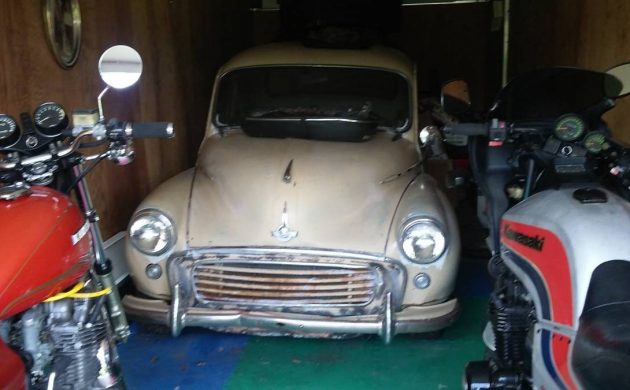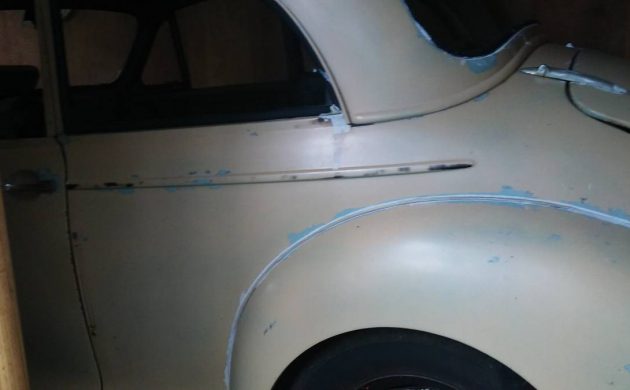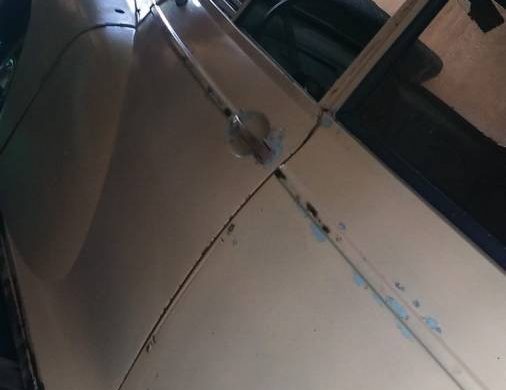Little British Project Car: 1960 Morris Minor
The Morris Minor and the original Mini share two things in common. The first was that both cars were designed by Alec Issigonis. The second was that their manufacturer saw both car designs as too radical, and their objections very nearly killed off both cars before they could make it beyond the design stage. That both designs were enormously successful and remained in production in updated form for more than two decades demonstrated that the designer had gotten it right. This Morris Minor is listed for sale here on Craigslist. It is located in Kissimmee, Florida, and is offered for sale with a clean title. The little Morris is priced at $2,700.
The Morris Minor was designed by Issigonis to be a rugged and roomy little car that was easy and pleasant to drive. Certainly, they had to be hardy, as Winter in England can be incredibly hard on vehicles, and this meant they had to be resistant to rust. This Morris is a restoration project, but the body looks to be quite solid and free of rust. It is important to check the frame to ascertain its condition, as no information is provided by the seller.
When he was designing the car, Issigonis stated that it was a small car to be driven by big people and that they deserved a spacious car. As a result, the Minor was one of the first British volume production cars to feature independent front suspension rather than a beam axle. This allowed the engine to be mounted further forward in the chassis, and the wheels to be mounted closer to the corners of the car. This increased available cabin space, and for a car of just over 12 feet in total length, a Minor could seat four fully grown adults in surprising comfort. With this Morris, it is hard to tell the state of the interior trim, but the interior is quite hard-wearing and robust, and replacement trim material is readily available.
The seller doesn’t give away much about the mechanical health of the car, except to state that it doesn’t run. The engine should be the 948cc inline 4-cylinder engine, backed by a 4-speed manual transmission. These cars also featured 4-wheel drum brakes. The Morris drive-train is quite resilient and is also easy to maintain or repair, so the engine in this one may be able to be revived. If you were buying this without a view to restoring it to original condition, the A-Series engine and matching transmission from the Datsun range are both simple to install and provide major improvements in both performance and fuel consumption.
The Morris Minor is a car of amazing simplicity that is easy to work on, restore and maintain. Good examples are commanding prices of $10,000 upwards. This one looks to be a solid example, and restoration of this one should potentially be quite straight-forward. If you are looking for your first project car, then this one would seem to be a strong candidate.
Auctions Ending Soon
 2006 Ford Mustang Saleen S281 SCBid Now23 hours$15,000
2006 Ford Mustang Saleen S281 SCBid Now23 hours$15,000
 2002 Subaru Impreza WRXBid Now3 days$100
2002 Subaru Impreza WRXBid Now3 days$100
 1975 Chevrolet Corvette ConvertibleBid Now4 days$3,000
1975 Chevrolet Corvette ConvertibleBid Now4 days$3,000
 1964 Ford F-100 Camper CustomBid Now4 days$2,000
1964 Ford F-100 Camper CustomBid Now4 days$2,000
 2006 Jeep Wrangler SportBid Now5 days$7,500
2006 Jeep Wrangler SportBid Now5 days$7,500






Comments
These are a neat liittle car, Need pictures. Great project. Good luck to the new owner.Look it over in person!!!
Cheers
GPC
big block!!!!
lol
Fiat twin cam with 5 speed
I had a Morris Minor Traveler with a Lancia 1800 twin cam and five-speed. An almost common conversion in UK
Good Moggies at a reasonable price are rare commodities. Check it carefully.
Re: Adam Clarke – one can’t check the frame for rust – there isn’t any due to it’s unitized construction. The pickup, van and Traveler (Woodie) versions however did have stout frames.
An interesting ‘factoid’ about Issigonis’ original design – it was about four inches narrower than what was built and that’s why early cars have bumpers made in multiple pieces – they were first built for the narrower version that never made it into production! I think it also explains the “ridge” running the length of the bonnet, er, hood!
@Ching a trailer. I believe that the reason for the ridge down the bonnet was because Issigonis originally designed the car to have a flat four engine but was overruled by management. Urban legend or not, I’m not sure.
The original engine was a side valve four, which would have been much smaller vertically. Those cars are recognizable also by having their headlights down at the sides of the grille. They were also miserably slow, though they do have a following in the UK. But Yes, Issigonis did want a flat-four, but they shot him down early on that.
There is a ton of room in the engine compartment for whatever you want to put in it but the BMC 1275 is a bolt in and can be pumped to 100 reliable street horse power. Hood is an example of a car that is literally bolted together vs welded. The pickup version is a real Erector Set.
What about the z-1 or the turbo gpz 750?
The whole engine and gearbox internals are exactly the same as an early Mini,
great little cars, quite lively and handle well, engine from am MG midget slots straight in and looks factory correct apart from the twin carbs, or fit a single 1 1/2″ carb and no one would know!
Pat,
Isn’t this Minor a longitudinal (north/south) engine/transmission setup vs the Mini’s transverse arrangement? Transmission effectively in the engine sump.
You’re right about the Spridget swap, though. Separate engine and transmission in these.
JFG
Datsun 1200 or 1400 engines with 5-speed from a B210 are also a common swap and very nearly bolt-in. The biggest drawback is they pretty effectively eliminate the oil leaks, overheating, bad transmission synchros, smoking electrics and all the other lovable charms that BMC engineered in! What fun could that be??
Saw an unrestored one the other day at the Tucson auto show.
I was stunned at the size of it’s engine, meaning it’s length and width.
All I could think was: How big could the pistons be ? The width of a prescription bottle? It was remarkable.
I love cars like these. Their beauty is in their simplicity.
There was a Morris Minor truck there too with paperwork from the factory featured in a frame.
My first car as an apprentice back in 1974 was a yellow 1000cc Morris Minor which had been redone head to toe. I cannot say i’ve ever felt the same sense of enjoyment or satisfaction in any other of the 10 vehicles i’ve had in 40 years since. Only replaced the differential once with a Baby Austin Differential and sold the vehicle to a friend thereafter before going to the Army for 12 month’s.
Ten vehicles in 40 years? Slacker….. :) Kidding.
MEF 369, & RBG 310, my fathers 2 moggies from when I was a kid, the only two british car registration numbers I remember, great little cars, keep the front suspension greased regularly, go for ever, in 1969, my father finished rebuilding the engine on a Friday, on Saturday, mother, father and 16 yr old me, 2 big luggage cases on the roof, we set off from Manchester to Dover, over the channel, all the way to Austria, not a murmour, not even an oil drip, great memories,
As much as I like Lampredi’s gorgeous twin-cam engine, and have seen at least two Minors with them installed, the low-cost availability of the BMC A-series engine and the stunning ease (and cheapness!) with which anyone can do almost anything to it make it my first choice. Dirt cheap and easy to find, small enough and light enough and as close to bulletproof as they get, that engine and that chassis are my main reasons for wanting one of these things someday. Well, and how nice they are to drive, too. I’ve already had two of Mr. Issigonis’s Minis, and I’m over those, now that my body is no longer limber enough to work on them. An upgraded differential would be about all the mods I’d need …
The 1275 Spridget motor is a bolt in. The largest issue would be finding proper tires for it (not very large at all.). I saw one with wire wheels (I think from an MGA) and the most beautiful BRG paint (enamel, please) job I’ve ever seen. I truly hope that this little car finds someone to love it. They are special little buggers. I’m too old, and the garage is too small — but I’m showing this one to the wife anyway. Its not far away.
Thirteen inch Chevrolet Vega wheels are a direct bolt-on to a Morris, Sprite or Midget. But John, these are very tiny cars – how can your garage be too small? Maybe you’re looking at the doghouse instead??
Yes the ridge is also due to the body being widened on production versions. Virtually no eng/gearbox parts are shared with the mini.
That is correct. The Mini had some changes made to accommodate the transverse mounting design. Some thigns, perhaps the head and motor peripherals might be interchangeable, but the block and transmission are totally different. Many of the Morris mechanical parts are quite interchangeable with the various Sprites and Midgets, though. I’m told, also, that there are sometimes issues with the rear axle, and when I used to hang around the MG store, the general advice was to swap the Spridget rear axle when you swap the motor. Do keep in mind that you may find some other “quirks” like a 6 volt electrical system, and positive earthing. You will even find the word “Lucas” sprinkled about on the various electrical components. You will get to put Moss Motors on speed dial. But you will love the little car.
I am not aware of BMC ever building a car with 6 volt electrics. Positive ground yes, but not 6v! The only British cars I’ve ever had with six volt electrics were my Bond MiniCar and my old Ford Anglias and Pops. The Bond is understandable as it used motorcycle drivetrain and the Ford, well ol’ Henry was probably too cheap to pay for 12v when 6v would do!
They got some where’s near 55 miles per gallon in the late 60’s by the manual I got with my 1967….hope to have a Traveler some day….
And if you truly believe that . . . I hear there’s a bridge for sale in Brooklyn.
Who knows? It seems pretty unlikely, though. My 1275 Midget produced 30 to 32 sometimes, more usual was 25. The 948cc cars were likely about the same, maybe a few mpg more, but they turned a taller gearset, too. The Mini has approximately the same coefficient of drag as the average barn door.
Conservatively driven at no more than 45 mph I suppose “actual” mileage in the low 40s was probably possible, and about 20% more on an Imperial gallon than on a US gallon. There were no “Truth in Advertising” laws back then. Consider my modern fuel injected motorcycle with electronic ignition only gets about 40 mpg at 80 mph and maybe 60 mpg at 55 mph. And it’s a heck of a lot lighter and smaller than a Morris Minor!
I want the Kawasaki’s Z1 and a GPZ
I have a 1098 and a 1275 Midget. Never achieve anything more than low 30 mpg with original drivetrain, on a good day, downhill. Drag coefficient about the same as a barn door as well with the flat front and upright windscreen.
My only Spridget (don’t even remember which it was after fifty years!) was I think a 1098, and it mostly got that 30-ish kind of mileage. Both Minis were 850s, though, and even flogged hard they’d run mid-to-high 30s, but on road trips 40-some was easy, square body and all. When the OPEC gas crisis was in full swing guys were mobbing me at gas stations, offering me up to $2500 or so to TRADE! A year or so later, with GF and I heading from California to Nashville, I was glad I’d kept it!
Are you still in Nashville, Will?